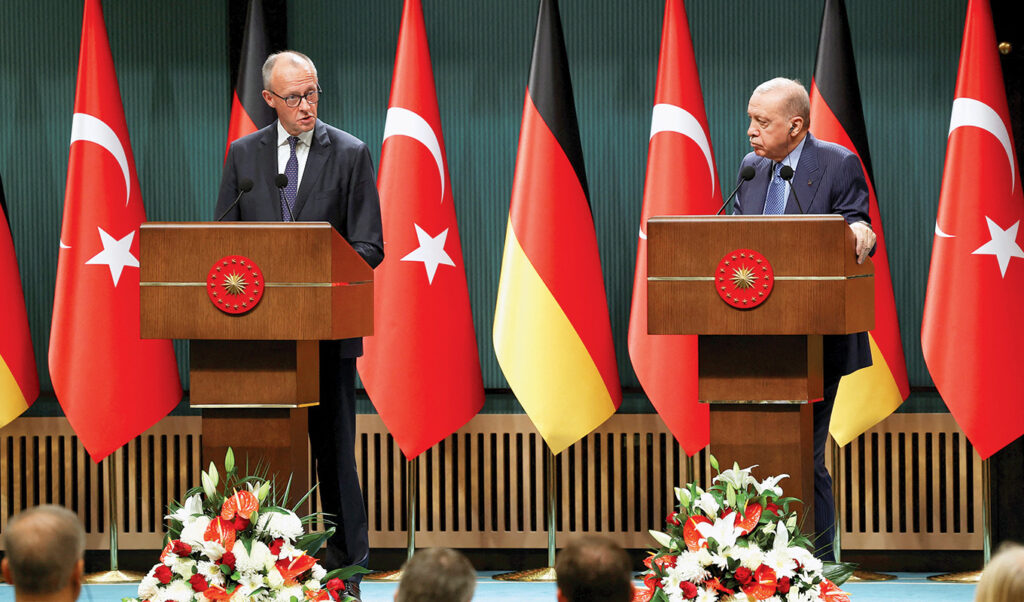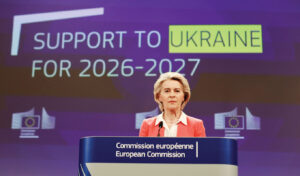A grandiose reception, complete with mounted soldiers, military marches, the characteristic tricolor carpet symbolizing pan-Turkism, and cannon salutes, was reserved by Tayyip Erdogan for the German chancellor. Friedrich Merz traveled to Ankara on Thursday with the goal of laying the groundwork for a Euro-Turkish approach as he envisions it. Naturally, Athens’ attention was focused there, as what was discussed directly affects the Greek side. Fr. Merz put a German “seal of approval” on the Eurofighter sale to the neighbor and went so far as to say that Turkey would protect all NATO allies with these fighter jets, including Greece. An oxymoronic statement that many heard but few noticed.
Eurofighter: The Merz-Erdogan meeting and what the deal provides
The Merz-Erdogan meeting took place before the ink had dried on the agreement signed on Monday by the Turkish president with British Prime Minister Keir Starmer. The deal initially provides for the sale of twenty aircraft to the neighbor, with an option for another twenty, from the British, German, Italian, and Spanish consortium. 37% of each aircraft will be manufactured in the United Kingdom, with the remainder coming from the program’s partner countries. “We must leave behind the difficulties of the past in defense industry product procurement and focus on joint projects. We welcome the positive steps that Germany has recently taken in this field, such as the Eurofighter aircraft procurement process,” T. Erdogan stated after his meeting with Fr. Merz. For his part, the German chancellor confirmed German consent while simultaneously “smoothing” the rough edges of the agreement that displease other allies, mainly Greece and Cyprus. “These aircraft increase the protection and security of all NATO allies,” Mr. Merz declared.
In other words, he said that Turkey’s fighter jets – from the state that threatens Greece with war – would… protect our country. The fact that Turkey settled on Eurofighters as a necessary solution, since the Americans won’t give them F-35s, doesn’t particularly trouble Athens, as the air balance continues to tilt in Greece’s favor. Having already secured fifth-generation F-35 fighters from the US, having included Rafale jets carrying Meteor missiles in its “quiver,” and having upgraded its F-16s to Vipers, our country is not worried. “It will take Turkey many years to catch up to us,” experienced analysts estimate, speaking to this reporter, adding: “This development should neither frighten nor particularly concern us. Twenty or forty Eurofighters represent a calculable force, but won’t seriously change the situation between the two air forces.”
Opposing views on SAFE
Regarding the European SAFE defense lending program and Ankara’s participation in it, Athens and Berlin have diametrically opposed views. Greece has made clear that it will not give the “green light” for Turkey as long as the neighbor refuses to lift the casus belli. “The relevant article of the regulation presupposes agreement by a third country with the EU for that country to be able to join the program in principle. Greece has made clear that the necessary conditions for Turkey’s participation are not currently met. As long as the Turks have a pending casus belli against Greece, as long as Greek island sovereignty in the Aegean is disputed, we obviously cannot agree to such participation. I wish Turkey would change its view on these issues. I don’t foresee this happening in the immediate future. So there’s no issue regarding Turkey’s participation in the program,” Kyriakos Mitsotakis clarified days ago from Brussels. On the opposite side, Mr. Merz wants Turkey in SAFE, not only for political reasons but also to ensure synergy between German and Turkish companies and keep the neighbors in his own “camp.” He’s going against the Greek veto because he sees that Turkey already cooperates closely with Italy and Spain, but not with Germany. However, in Thursday’s press conference with Mr. Erdogan, Mr. Merz made no reference to SAFE.
Migration
Reducing migration flows appears to be a priority for Germany. Berlin knows that the key to achieving this goal lies in Turkey’s hands. This is because Turkey is the one that opens and closes the tap at will, periodically weaponizing flows to gain economic and/or political benefits. Mr. Merz knows there can be no effective control at Europe’s eastern borders without Ankara’s assistance. That’s why he raised the issue with T. Erdogan, while noting that Berlin wants further progress on repatriations. His tactics benefit Greece as a host country that cannot bear the entire burden of the flows alone. A burden and responsibility that northern European countries refuse to shoulder.
Published in Parapolitika




